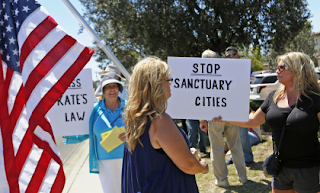Texas Republicans have spent many years trying to crack down on illegal immigration, especially those coming across the southern border with Mexico. Emboldened by the election of Donald Trump, however, the time may finally be right for the GOP to mobilize an assault on loosely defined "sanctuary cities," especially with two large counties eyeing such policies.
Texas Gov. Greg Abbott has pushed the issue to the front of his unofficial agenda for 2017, pledging in interviews and on social media to sign into law a "ban" on cities and local governments that are seen as protecting people in the U.S. illegally, with sanctions such as cutting state funding.
Previous pledges by Republican governors and GOP-majority legislatures never have made it into law in Texas. But the political tide has changed, says Sen. Charles Perry, a Lubbock Republican, who has tried to pass a sanctuary cities ban for several years and already filed a bill for the session that starts in January.
"The American people made it clear that solving our illegal immigration crisis must be a priority," Perry said. "That starts by eliminating sanctuary cities, securing our border and enforcing the immigration laws we currently have on the books."
Some cities across the country, like Chicago, New York and Seattle, have adopted formal sanctuary policies — forbidding police from asking about a person's immigration status or cooperating with federal immigration officials. Nothing like that exists in Texas, civil rights activists say.
"Every county in Texas, they let (immigration officials) into their jails to review the booking sheets to see who's been brought in and review their status," said Terri Burke, executive director of the Texas chapter of the American Civil Liberties Union.
The sanctuary cities issue struck a national note in the 2016 presidential campaign when a woman was shot and killed in San Francisco by an alleged gunman who had been deported multiple times and recently released from jail by local authorities. Trump promised to "end the sanctuary cities" and said those "that refuse to cooperate with federal authorities will not receive taxpayer dollars."
Texas Gov. Greg Abbott has pushed the issue to the front of his unofficial agenda for 2017, pledging in interviews and on social media to sign into law a "ban" on cities and local governments that are seen as protecting people in the U.S. illegally, with sanctions such as cutting state funding.
Previous pledges by Republican governors and GOP-majority legislatures never have made it into law in Texas. But the political tide has changed, says Sen. Charles Perry, a Lubbock Republican, who has tried to pass a sanctuary cities ban for several years and already filed a bill for the session that starts in January.
"The American people made it clear that solving our illegal immigration crisis must be a priority," Perry said. "That starts by eliminating sanctuary cities, securing our border and enforcing the immigration laws we currently have on the books."
Some cities across the country, like Chicago, New York and Seattle, have adopted formal sanctuary policies — forbidding police from asking about a person's immigration status or cooperating with federal immigration officials. Nothing like that exists in Texas, civil rights activists say.
"Every county in Texas, they let (immigration officials) into their jails to review the booking sheets to see who's been brought in and review their status," said Terri Burke, executive director of the Texas chapter of the American Civil Liberties Union.
The sanctuary cities issue struck a national note in the 2016 presidential campaign when a woman was shot and killed in San Francisco by an alleged gunman who had been deported multiple times and recently released from jail by local authorities. Trump promised to "end the sanctuary cities" and said those "that refuse to cooperate with federal authorities will not receive taxpayer dollars."

